Educators
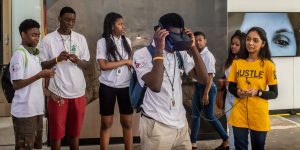
Curators’ Conversation
Ralph Borland, Cezanne Charles, Olga Stella, Antajuan Scott, Mark Sullivan, Devon Akmon
Take a look into the process of planning our third exhibition FUTURE PRESENT and hear from the panel of curators to get an overarching view of our subthemes. We will also answer questions from the Science Gallery Community.
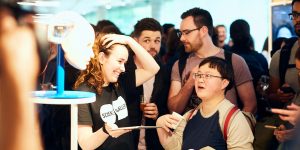
THE INVISIBLE REMAINS OF CARROWKEEL
An exploration of ancient genetics and the history of neolithic tombs as featured in NATURE in June 2020 by Trinity College Dublin geneticist Lara Cassidy (IE)
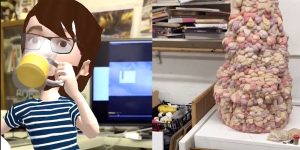
INVISIBLE Studio visits with Andy Holden and Thijs Biersteker
Andy Holden (UK) and Thijs Biersteker (NL)
Join us for a behind-the-scenes studio visit with INVISIBLE artists Andy Holden (UK) (INVISIBLE / DARK MATTER) and Thijs Biersteker (NL) (INVISIBLE - Gravitational lensing)
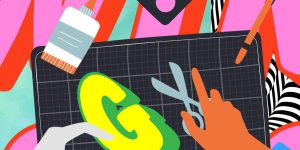
HOLD ON TO THE GOOD THINGS, IMAGINE THE BEST THINGS
An opportunity to reflect on COVID-19 and its effects on society, and speculate on what comes next. What roles do science, technology and art play here?
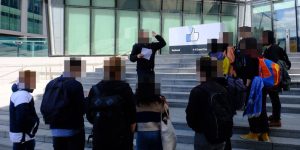
An Online Tour of Dublin’s Tech Infrastructure
Dublin is host to the European headquarters of many of the most powerful and influential tech companies of the modern era, and has become an important strategic location within the context of debates surrounding data sovereignty, privacy and security. By connecting our own personal interactions on digital platforms to the corporate offices in the city centre and to the data centres that surround the city, this tour critically engages with these debates, whilst also reflecting on our relationship with our personal data as it passes through the many visible and invisible networks that surround us.
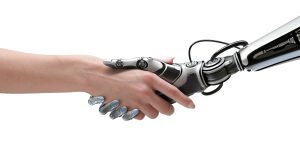
Citizens' Think-in on Artificial Intelligence
Artificial Intelligence (AI) is playing a growing role in our lives. Machine learning tools help determine the ads you see online, the news you read and the products you purchase. Every time we send a text, use a credit card or sync a wearable device we are sharing personal information about ourselves. But what are the social consequences of AI? How is our information being used? Who is setting the policies and regulation? And how can AI affect our privacy and civil liberties?
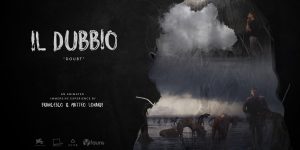
The Art of Doubt
Matteo Lonardi, Velasco Vitali, Michel Reilhac, Marco Faini
Doubt has played a critical role in both society and art, since the time of the renaissance, when it first entered the public sphere as a distinct concept. Ca’ Foscari University of Venice researcher Marco Faini will explain the concept of doubt, while Matteo Lonardi, Francesco Lonardi, and Velasco Vitali will speak about the role of doubt in the artistic process from Leonardi Da Vinci to contemporary artists.
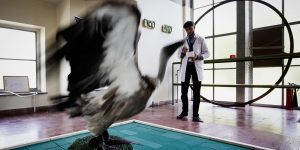
Earth Water Sky Artist Residency
Haseeb Ahmed (US)
2020 Earth Water Sky artist in residence Haseeb Ahmed (Sky) will present his film “The Wind Egg” and discuss his body of work, notably on particulates and the particular narratives carried by the wind, which is also the subject of his residency at Science Gallery Venice. The presentation will be followed by a question and answer session open to the public, moderated by residency producer/curator Ariane Koek.
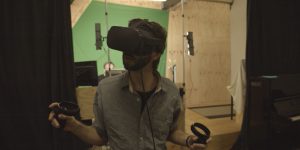
Fertile Methodologies
Tactical Space Lab (AU)
The Tactical Space Lab is a research initiative focusing on the intersection of art and technology. We are committed to expanding the diversity of stories and voices represented through new technologies via collaborative projects and educational programs across all ages, with the aim of ‘demystifying’ VR, not just for artists, but for the wider community.
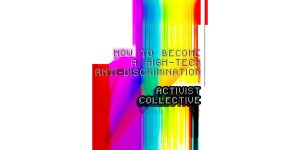
Nushin Isabelle Yazdani und Internet Teapot (Karla Zavala und Adriaan Odendaal): [d/r]econstructing AI - dreams of visionary fiction and zine-making
How to Become a High-Tech-Anti-Discrimination Activist Collective
With this workshop we investigate the structures behind algorithmic decision making systems, discuss why their design is normative, and how AI systems reinforce structural discrimination. We embark on a speculative journey and discuss how to design to create a more just world. Which artists inspire us? Which values are important to us? We want to collect our thoughts and creative outputs in a zine.

LAB ON STAGE (Adriana Torres Topaga, Martyna Lorenc and Andrea Maria Handler): Phantom Data in our bodies and imagination
How to Become a High-Tech-Anti-Discrimination Activist Collective
This workshop undertakes a performing arts’ approach. Our departure is the embodiment of imagination and perceptual processes. With somatic exercises and performative games, we notice the data flowing in from our bodies: sensation, image, emotion or memory. Imagination has its own training dataset - therefore a specific priming/bias/imprint. We look for practices of becoming aware of HOW we imagine things and what escapes our field of attention.

Astrid Mager und Hong Phuc Dang: How to create your own AI device with SUSI.AI - An Open Source Platform for Conversational Web
How to Become a High-Tech Anti-Discrimination Activist Collective
The workshop introduces SUSI components like SUSI’s technology stack, its wiki-like skill editor and hardware prototype; participants work together to create a simple bot, develop new skills and test them. A reflection on data bias and algorithmic discrimination invites to collectively think about creating non-discriminatory digital technologies.

Doris Allhutter: “When I encountered discriminating IT-systems and did not want to take it anymore” - deconstructing affective entanglements in society-technology relations
How to Become a High-Tech Anti-Discrimination Activist Collective
This workshop uses the deconstructive method of mind scripting to understand the grip that even technologies that we reject may have on us. Using our own memories as an experimental resource we will explore how discrimination and privilege materialize in our practices. This aims at developing collective agency and activisms.

Safiya Umoja Noble: Algorithms of Oppression - How Search Engines Reinforce Racism
How to Become a High-Tech Anti-Discrimination Activist Collective
The landscape of information is rapidly shifting as new demands are increasing investment in digital technologies. Yet, critical scholars continue to demonstrate how many technologies are shaped by and infused with values that are not impartial, disembodied, or lacking positionality. Technologies hold racial, gender, and class politics. In this talk, Dr. Safiya Noble will discuss her recent book, Algorithms of Oppression, and the impact of technology on the public.

Lisa Nakamura: Estranging Digital Racial Terrorism After COVID
How to Become a High-Tech Anti-Discrimination Activist Collective
This talk argues that COVID-19 forced an accelerated migration to digital networks that exposed new audiences to traumatically racist digital events as well as new openings for critique and resistance.

How to Become a High-Tech Anti-Discrimination Activist Collective
IFG-LIT (AT)
New technologies have penetrated all aspects of our lives and promise a wide range of improvements and efficiencies. Contrary to general perception, though, the algorithms on which these technologies are based are neither neutral nor do they treat everyone equally.
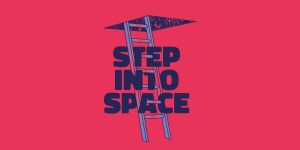
Space Art Tour – Educators Edition
Ars Electronica (AT), Ciência Viva (PT), Leiden University (NL)
Check out Space Art at the Ars Electronica Festival and get introduced to various tools for teachers and educators!
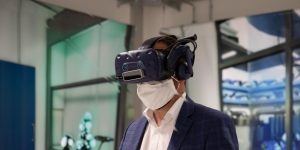
Robots Talking To Me
LIT Robopsychology Lab, Johannes Kepler University (AT)
How should robots communicate with people? What voice makes AI assistants sound trustworthy? Do we even have to listen to robots or should we always be in command ourselves? Under the title *Robots Talking to Me*, the *LIT Robopsychology Lab* presents four installations that give tangible expression to questions of human-machine relationships and invite participation.
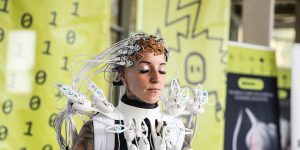
The Pangolin Scales
Thomas Faseth (AT), Harald Pretl (AT), Christoph Guger (AT), Anouk Wipprecht (NL)
The Pangolin Scales demonstrates the world’s first 1.024 channel brain-computer interface (BCI), which is able to extract information from the human brain with an unprecedented resolution to control an interactive, fashionable dress.
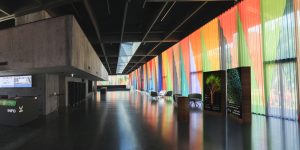
Treeversity
Johann Höller (AT), Thomas Lorenz (AT), Florian Gruber (AT), Ursula Niederländer (AT), Tanja Illetits-Motta (AT), Raphael Blasi (AT), Andreas Rösch (IT), Stefan Küll (AT)
Treeversity focuses on the relation between Big Data and data visualization to convey complex information at a glance. A mirror of the university’s inner workings, diligently recording success, failure and evolution. A portrait of its life in the form of a tree. Courses, grades and exams become branches, creating many different trees. Fully grown or nascent, withering or growing erratically. Treeversity shows the university as a forest, providing a tool to analyze its mechanisms at the same time.


